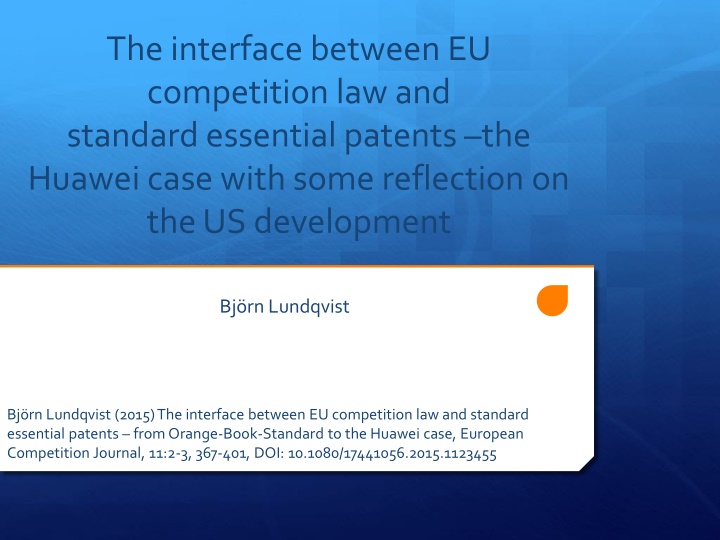
Interface Between EU Competition Law and Standard Essential Patents
Explore the complexities surrounding Standard Essential Patents (SEPs) and FRAND commitments in the context of EU competition law, with a comparison to US developments. The discussion includes issues like patent wars, abuse of dominant position, access to SEPs on FRAND terms, and the implications for industry standards and consumer benefits.
Download Presentation

Please find below an Image/Link to download the presentation.
The content on the website is provided AS IS for your information and personal use only. It may not be sold, licensed, or shared on other websites without obtaining consent from the author. If you encounter any issues during the download, it is possible that the publisher has removed the file from their server.
You are allowed to download the files provided on this website for personal or commercial use, subject to the condition that they are used lawfully. All files are the property of their respective owners.
The content on the website is provided AS IS for your information and personal use only. It may not be sold, licensed, or shared on other websites without obtaining consent from the author.
E N D
Presentation Transcript
The interface between EU competition law and standard essential patents the Huawei case with some reflection on the US development Bj rnLundqvist Bj rn Lundqvist (2015) The interface between EU competition law and standard essential patents from Orange-Book-Standard to the Huawei case, European Competition Journal, 11:2-3, 367-401, DOI: 10.1080/17441056.2015.1123455
What is the issue? The Patent War. When may holders of standard essential patents (SEPs), who made FRAND commitments, be abusing its dominant position? When, for example: Making use of injunctions, and/or Not giving access to SEPs on FRAND terms, Demand to obtain cross-licenses/grant backs of non-SEPs, non- challenge covenant, Selling SEPs to PAEs, Over declaring patents as essential, or Discriminate in case of giving access to SEPs, thus Whether and when holders of SEPs are obliged under competition rules to grant access to SEPs on FRAND terms?
Background Industry standards are needed for IT interoperability, telecom and other forms of networks. It creates compatibility and interoperability among products and services, which is increasingly essential to many industries. Generally leads to economic efficiency and significant consumer benefits, but Interoperability standards are both plagued by network effects and the infrastructure of today s society Proliferation of IPR:s in certain important industries Defensive Patenting and Strategic Patenting Patent Thicket Anti-commons Mutual Assured Destruction (MAD) Patent Wars Proliferation of SSOs, consortia and fora
Standards cases EU Cases and investigations IGR/Salora (1981; 1984) X/Open Group (1987) ETSI IPR Undertaking (1994) Rambus (2009) Qualcomm (2009) IPCom (2009) EMC (2010) Standard & Poor s (2011) Fr.bo (2012) Google/Motorola (2012) Honeywell (opened 2012) Samsung and Motorola (opened 2012) Servier (opened 2012) German cases, e.g. Standard Tight-Head Drum (2005) Orange-Book-Standard (2009) Dutch cases Huawei v. Ztd (2015) US Cases and investigations In re Dell (FTC, 1996) Allied Tube (1988) plus other cases Unocal (FTC, 2004) Qualcomm v. Broadcom (various) Rambus (FTC 2006, D.C. Cir. 2007) US Philips I and II (Fed.Cir. 2005; 2010) Various ITC cases eBay (S.Ct. 2006) Apple v. Samsung (Northern California 2012) Apple v. Motorola (Northern Illinois 2012) Microsoft v. Motorola (W.D. Wash. 2012) FTC Google consent order (2013)
The US doctrine Under IP law, Ebay-rule No injunction, public policy considerations Rewarded damages, i.e. compulsory licensing scheme However, patent misuse, estoppel, waiver doctrines imply that deceiving a SSO may render the SEPs in fact unenforceable (Federal Circuit, Qualcomm) Under Art. 5 FTC Act, unfair competition Google, Re. Bosch etc. Art 5 FCT Act, but beyondAntitrust law. No black clauses Under Antitrust law Sherman Act sec. 2 may be applicable (attempt to monopolize) when an patentee deceive an SSO According to Rambus, need to show anticompetitive effect Antitrust law more patentee friendly than IP law?
European development Patent ambush/excessivepricing Rambus(2009) Qualcomm (2009) IPCom (2009) Dominance Google/Motorola (2012) Injunctionsand interpretation ofFRAND Samsung and Motorola (2014) Huawei v. Ztd (CJEU 2013) German cases Standard Tight-Head Drum (2005) Orange-Book-Standard (2009) Motorola, Microsoft, Apple, Nokia, Ericsson, IPComin several courts UK cases Nokia v. IPCom Motorola, Microsoft, Apple,
Huawei-case Onlyin exceptionalcircumstances maythe constitutionalcharacterof intellectualpropertyrights be restricted, and the ECJ agreesthatin the dispute before the Court, a new exceptionalcircumstancescenario is at hand: first, by the factthatthe patent at issueis essentialtoa standard establishedby a standardisationbody, rendering its use indispensableto all competitors whichenvisagemanufacturingproducts thatcomply with the standard to whichit is linked Secondly, the caseshouldbe distinguishedby the factthatthe patent at issueobtainedSEP status onlyin return for the proprietor sirrevocable undertaking, given tothe standardisationbody in question, thatit is preparedto grant licenceson FRAND terms.
Huawei-case continue ECJ stipulatesthe goodgovernanceprocedural rules, whichthe partiesin these situations must adhere toso not, on the onehand, toabuse a dominant position, nor, on the other, cause the national court toagreeto order an injunctionand removalofgoods. In this part ofthe judgment the ECJ followsthe few procedural rulesstipulatedby the AG, whichin turn, to a largeextent, mirror the outlinein the Samsung decision by the Commission and the FTC Google settlement. The proprietorshouldoffer a license on FRAND terms. The willinglicenseeshoulddiligentlyreply and accept or otherwise produce a counter-offer. However, the ECJ is alsosomewhatmore conservative.
Comparativa analysis The USA the IP law connected doctrine under the rules of injunction seems to imply that equity and public policy considerations above and beyond the ambit of US Antitrust law is the US development also above and beyond An euro (competition law) defence? In other words, easier access to SEPs in the US? In Europe it seems that EU Competition law is more readily available than the exemptions under Member States patent laws. Public policy requirement not fulfilled? An indication how fast the US jurisprudence may shift
Thank you, Dr. Bj rn Lundqvist, bl.jur@cbs.dk
The source of the problem, IP law. Are we seeing an embryo to a solution? New patent rules in the USA, and a new EU patent system Post-grant opposition in the US Third parties may submit prior art Supreme court cases eBay (2006) KSR v. Teleflex (2007) the obviousness Quanta v. LG Electronics (2008), exhaustion or first sale principle MedImmune (2007), standing Combined effort US and EU PTO regarding lessening certain malfunctions. E.g. trying to limit the possibility for divisionals of patent applications, the amount of pending patents and the number of claims More collaborations between PTO and competition authorities? More collaboration between PTO and SSOs?



